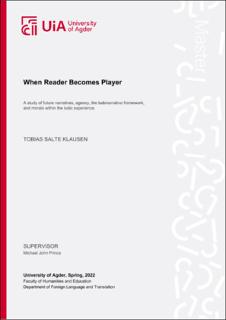| dc.description.abstract | Video games have broken their niche appeal, becoming a mainstream medium on par with literature and cinema. The popularity of the medium is not the only thing which has evolved, but also the capacity for video games to produce and create unique experiences for its players within the ludic playground. The aim of this thesis is to explore in which ways video games present a more attractive experience in comparison to the traditional narrative of literature and cinema. To aid in this pursuit, the video games Undertale and Disco Elysium have been selected as case studies. To aid in the discussion, the theoretical framework of future narratives, non-unilinearity, the ludonarrative and ethical and moral have been selected to gain further understanding of how they work in each video game.
As a result of employing the theoretical framework, the thesis expounds on the many ways video games utilizes these tools to afford the player a distinct experience unique to the medium. | |
